Welcome to the Ex Libris Cloud 2.1
Version 2.1
A newer version is available here
Introduction
Congratulations! You have joined hundreds of Ex Libris customers enjoying the benefits of using the Ex Libris Cloud. This document presents the technical details you need know in order to get started and join the Ex Libris cloud
Purpose of This Document
This document lists the benefits of using the Ex Libris Cloud services together with general instructions for new customers joining the Ex Libris Cloud.
The Cloud Deployment Model
Ex Libris operates a private cloud offering that is available for the sole use of the Ex Libris customer community. This deployment model differs from a public cloud, which is available to the general public, or a hybrid cloud, which is a combination of two or more clouds.
Private cloud implementation provides Ex Libris with the opportunity to benefit from cloud computing without compromising on the architectural control required to ensure integrity of its customers’ data, systems, and processes.
Security
Ex Libris is Committed to providing its customers with a secured and reliable environment, Ex Libris has developed a multi-tiered security model that covers all aspects of cloud-based systems. The security model and controls are based on renowned international protocols and standards and industry best practices, including ISO/IEC 27001:2013, ISO/IEC 27017:2015, ISO/IEC 27018:2014,ISO/IEC 22301:2012 and CSA Star Self-Assessment.
Ex Libris has received several security and privacy certifications, including ISO/IEC 27001:2013, ISO/IEC 27017:2015, ISO/IEC 27018:2014, ISO/IEC 22301:2012 and CSA Star Self-Assessment. The ISO/IEC 27018:2014 standard establishes commonly accepted control objectives, including controls and guidelines for protecting Personally Identifiable Information (PII) for the public cloud computing environment in accordance with the privacy principles in ISO/IEC 29100. ISO/IEC 27017:2015 provides a code of practice for information security controls, including guidelines that expand upon the ISO/IEC 27002 standard by adding security controls specifically related to cloud computing. The ISO/IEC 22301:2012 standard focuses exclusively on business continuity management (BCM).The CSA Star Self-Assessment provides transparency and quality assurance for Ex Libris cloud services.
The ISO/IEC 27001:2013 standard provides a model for establishing, implementing, operating, monitoring, reviewing, maintaining, and improving an Information Security Management System (ISMS). As part of the company’s focus on security issues, Ex Libris employs a dedicated Ex Libris Chief Information Security Officer (CISO) who is the contact person for security issues and a Privacy and Regulation Officer for privacy and regulation issues and a dedicated security team along with a Cloud Services team that are responsible for the following tasks:
- Applying the security model to all system tiers
- Monitoring and analyzing the infrastructure to detect suspicious activities and potential threats
- Issuing periodic security reports to Ex Libris management and customers
- Dynamically updating the security model and addressing new security threats
- Systematically examining the organization’s information security risks, taking into account threats and vulnerabilities
- Designing and implementing a coherent and comprehensive suite of information security controls and/or other forms of risk treatment (such as risk avoidance or risk transfer) to address those risks that are deemed unacceptable
- Adopting an overarching management process to ensure that the information security controls continue to meet the organization’s evolving information security needs
Ex Libris is committed to securing the information that the customer community stores in our systems. Each one of the controls that form part of our multi-tiered security model is upheld throughout the organization. The security model is constantly monitored and tested to maintain a high level of security, thus granting Ex Libris users—libraries and their patrons—peace of mind with respect to the privacy, confidentiality, integrity, and availability of their data.
For any security related questions or issues, open a support CRM case or contact the Ex Libris Chief Information Security Officer (CISO) at SecurityOfficer@exlibrisgroup.com.
Services You Will Receive
The application is hosted on hardware owned by Ex Libris at a central secured data center. Ex Libris periodically updates and upgrades the system. The following are some key points:
- Hardware maintenance
- 24 x 7 professionally manned Hub Operation Center 24/7
- System Status page
- Monitoring services
- Redundant infrastructure systems – no single point of failure (power, climate control, fire control)
- Redundant infrastructure devices – no single point of failure (routers, switches, firewalls, load-balancers, storage arrays, etc.)
- Robust UPS facilities
- Diesel powered generators (independent power plants)
- No fewer than 3 ISPs providing OC3-level bandwidth to the facility with load balancing
- Backups are stored at the data center and are also saved in a separate offsite secured location
- Hardware and operating system upgrades and patches
- Application upgrades, patches and maintenance
- Security framework based on ISO 27001 certification
- Cloud Security based on ISO 27017 certification
- Privacy based on ISO 27018 certification
- Business continuity management based on ISO 22301 certification
- Security control and continuous monitoring
- Application availability based on SLA
Processes and Procedures
Ex Libris follows best practices processes and procedures to safeguard your system availability, integrity, and confidentiality. Some points to take note of:
- Root Cause Analysis (RCA) – Ex Libris performs internal root cause analyses for each service interruption for above 5 minutes and takes the necessary steps to avoid them in the future.
- Ex Libris implements reactive and proactive problem management based on ITIL in order to minimize both the number and severity of incidents and potential problems
- For SaaS multitenant environments, Ex Libris publishes RCAs in the Customer Knowledge Center.
- Capacity management – The Ex Libris Cloud group oversees capacity planning. Ex Libris products are inherently designed to be highly scalable and following ITIL capacity management processes including multi-layered thresholding and alert mechanisms. As part of our capacity planning, our cloud engineers continuously measure & monitor our existing and new implementations, as well as our future growth pipelines, to ensure we always meet capacity requirements. At the same time, our Cloud group monitors our existing customers’ growth and the systems’ performance trends. This approach ensures that Ex Libris can provision additional hardware and services to meet our growing customers’ needs in real time.
- Change Management – Ex Libris utilizes change management systems and detailed processes including approval cycles for each change in the cloud. Each change must be approved, recorded, and documented. The system avoids change conflicts and manages activities in the system.
- Availability – (Uptime Quarterly Reports) – For SaaS multitenant environments, Ex Libris has a quarterly availability report that measures and records system uptime services. This report is published and available for customers in the Customer Center
- Operating Center – Ex Libris Network & Security Operations Center (NOC/SOC) provides 24x7 logging and monitoring for all logical network access to customer data and information asset usage and is audited. Ex Libris monitoring consists of multi-layered, fully redundant systems that monitor the services inside and outside the Data Center to validate that services are running at the highest performance levels. For more information, see the 24X7 Hub contact details.
- On-Call rotations Engineers – Ex Libris has 24x7 on call expert infrastructure engineers such as, Security, Network, DBA, Storage, System, and dedicated On Call professional Application Developers that are notified by the operating center in the event of a service interruption.
Change Management
In order to prevent an unauthorized change in the cloud environment, and maintain the high level of service to our customers, Ex Libris has implemented change management procedures so that all activities are recorded, documented, scheduled, and approved. Every change in cloud production servers must follow the following procedure:
- planning stage – document, test procedure
- Approved cycle of the procedures, at least 4 eyes approval principle
- Coordination and notifications
- Execution in maintenance time
- Documentation
The Hub 24x7 NOC/SOC and Cloud teams are cloud continuously monitoring and continues auditing the process.
The Ex Libris Chief Information Security Officer (CISO) validates the procedure enforced and it is audited as part of the ISO audit and certification process that all security measures are in place.
Incident Management
Ex Libris has an Incident Response Policy. After Ex Libris determines that a security breach has occurred or that customer data has been compromised or accessed by an unauthorized person, Ex Libris notifies the customer as soon as reasonably practicable (and in any event, within 24 hours).
As part of the Ex Libris security incident response policy, Ex Libris commits to take prompt action to investigate the incident, mitigate any harm stemming from the incident, and take action intended to prevent any similar incidents from occurring, including, without limitation, the installation of appropriate patches or software fixes as soon as reasonably practical.
After Ex Libris has determined that a security breach has occurred or that customer data has been compromised or accessed by an unauthorized person, Ex Libris shall:
- Within 24 hours, or sooner if reasonably practical, notify the customer
- Take prompt action to investigate the incident and mitigate any harm flowing from the incident
- Assist the customer to make any required notifications to 3rd parties
- Take prompt action to prevent any similar incident from occurring, including, without limitation, the installation of appropriate patches or software fixes as soon as reasonably possible
Continuous Monitoring of Security Controls
Ex Libris performs multi-tiered security audits that include:
- security checks on a daily basis
- security reviews on a monthly basis
- application security vulnerability assessment scans on a quarterly basis
- third-party patching on a quarterly basis
- annual scan of network vulnerabilities
The ISO 27001 certification that Ex Libris passed successfully includes annual external audits to validate that all security measures and mitigations are in place.
Additionally, Ex Libris engages an independent security company that performs a security penetration test based on the OWASP Top 10 and SANS 25 best practices.
Ex Libris Monitoring System
Monitoring cloud operation is at the heart of guaranteeing a high level of service. Ex Libris monitoring is built on a multi-layered concept.
Monitoring multi-layered conceptual architecture systems include multi-systems that monitor the services inside and outside the Data Center to validate that services are running with the best performance indicators.
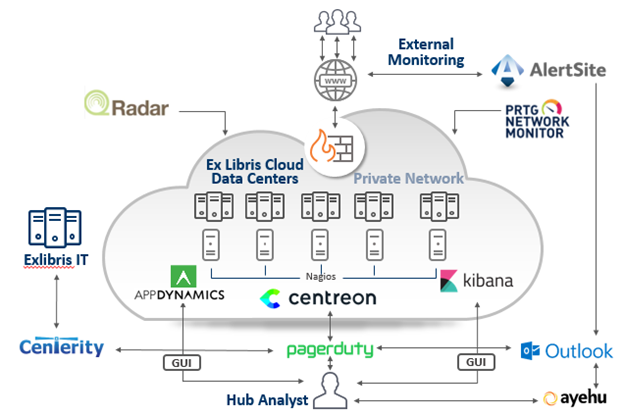
Access Control System
In order to increase monitoring and enforce our strict access control policies,
Ex Libris utilizes Access Control system, a privileged account security solution that performs the following:
- The access control system is the only focal point through which access to the Ex Libris cloud servers can be made
- The access control system validates if the user is authorized to access the server.
- Throughout the user’s activity on the server, the tool checks and enforces that only approved activity on the server is performed
- The access control system restricts access according to predefined user and policy restrictions
- Any session to a production server can only be made through the access control server (that is, from the authorized Ex Libris employee to the access control system and from the access control system to the server). In this way, the access channel itself is controlled
- All the data related to access rights, credentials, etc. are stored encrypted
- The predefined sensitive operation activity sessions are recorded and tracked for review
On a daily basis, Ex Libris’ Security personnel review a correlated audit and compliance report. Any suspicious activity, potential violations, or unauthorized access is handled immediately according to the Ex Libris Security response policy. These audit and compliance reports contain information that enables Ex Libris to track safe activities in order to meet audit requirements, including privileged accounts compliance status, entitlement reports, and activities logs.
Ex Libris Backup System
Ex Libris maintains a well-developed backup plan consisting of multiple snapshots per day, including a full daily backup. The backups are made to a disk, a reliable backup media, and is stored in a remote secured location. This ensures that, at any point in time, in case of a local disaster, Ex Libris has a secure copy of the data readily available. On a regular basis, Ex Libris performs system backups of application files, database files, and storage files. The privacy controls in practice at Ex Libris are enforced for all backup files.
- On-site backup – Full backups of the OS platform, application, and customer data are performed at least daily (multiple snapshots are taken during the day for critical services/systems) using storage snapshot technology. The backups are kept for one week on-site (not on separate disks) on highly available storage arrays. The snapshots are automatically mounted with specified access restrictions managed by the operating system in a specified set of directories that allows for an easy and immediate restore of the data at any time by Ex Libris authorized personnel.
- Off-site backup – Full backups of the OS platform, application, and customer data are performed daily using replication technologies over a dedicated, private secured network connection from the primary data center to an off-site backup location using the same storage technology as the storage at the primary location. Subject to the privacy controls in effect at Ex Libris, Ex Libris maintains the off-site backup locations in the same territory (NA, EMEA, and APAC) as the primary locations with a sufficient best practice physical distance. The backups can be restored to the main data center 24/7 by Ex Libris authorized personnel. The backups are kept at the off-site backup managed locations.
The restore procedures are tested on an ongoing monthly basis to ensure rapid and successful restoration in case of data loss or corruption. Additionally, a full copy of the data is maintained at a remote secured location.
Ex Libris Data Center Network Diagram
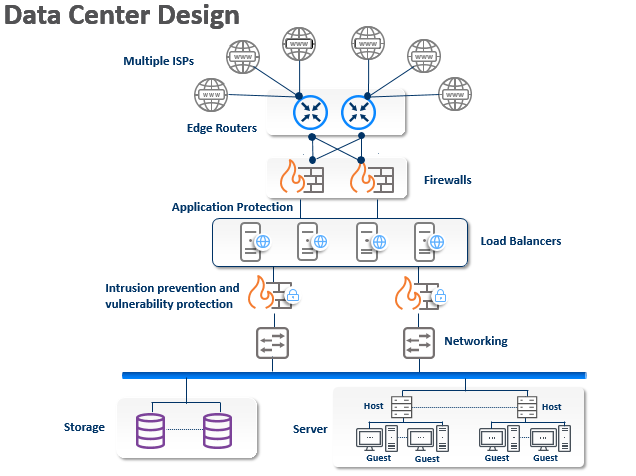
Security Layered Protection Approach
Ex Libris implement Layered protection process for ongoing and pro-active protection
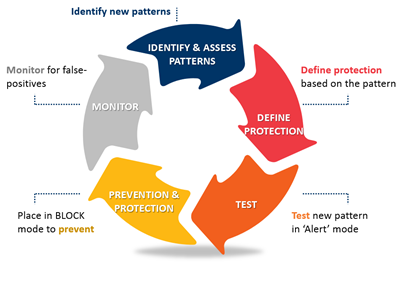
Ex Libris System Status Page
Hosted customers on SaaS environments
The Ex Libris System Status page displays the latest information on the availability of all multitenant Ex Libris instances. You can check this page at any time to see current status information or subscribe to be notified via email of interruptions to any individual service. If you are experiencing a real-time operational issue that is not indicated on this page, please inform Ex Libris by submitting a Case in the Support Portal.
The system status page holds instances for hosted customers on SaaS environments. This site displays live data along with historical data for the previous five days. Customers with single tenant hosted environments can also receive updates on a data center level, or on the product within the data center level.
For more details, see: System Status for Hosted Environments (Multi-Tenant and Single-Tenant)
Single tenant hosted environments
Note: Customers with single-tenant hosted environments can continue to view the status of their services in status.exlibrisgroup.com/single-tenant/
We encourage you to register for these notifications directly from the Support Portal.
When logging into the Support Portal, under your "Email Preferences" tab, you will find the full list of your Ex Libris products. Register here directly to receive updates from Support and the Cloud, and automatically subscribe to the System Status notifications as well.
Performance Indicators
The status of every instance is displayed via a Performance Indicator. More detailed information and timely updates can be found by hovering over these indicators.
| Status | Description |
|---|---|
|
Service for the instance is operating normally |
|
|
|
Service for the instance is operating normally, with some specific information provided by Ex Libris |
|
Service for the instance is available, but users may experience performance issues. |
|
|
|
Service for the instance is unavailable or disrupted |
|
|
Planned maintenance is taking place |
Scheduled Maintenance
Notifications of future scheduled maintenance are published in the Scheduled Maintenance column. Detailed information such as start and end times can be found by hovering over the maintenance dates.
Locating an Instance Name
To locate your hosted instance name on the Support Portal (Salesforce), simply log onto the Support Portal and select the desired account asset. If your environment is on the system status, your instance name will be displayed under the Instance Name on Status Page.
While you can register to the System Status Page notifications directly, we highly encourage you to subscribe to the Email Preferences mailing lists, where you will receive updates from Support and the Cloud, and will also automatically be registered to the System Status notifications for your environment.
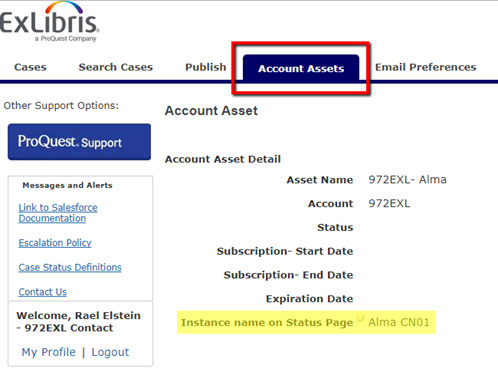
Cloud Status Notification Subscription
Email notifications regarding performance updates and upcoming maintenance of a hosted instance are sent to the instance’s subscribers.
In the Support Portal, you can you to set your “Email Preferences”. Setting your email preference for the product will automatically subscribe you to the correct environment in the System Status Page.
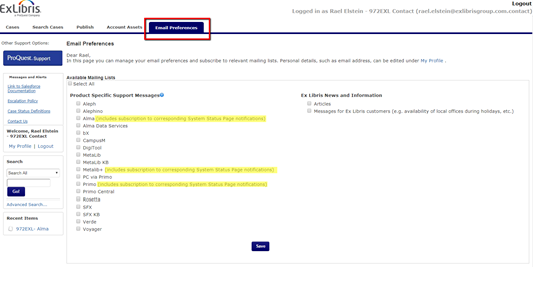
If you want to receive email notifications from the Status page only, click the letter icon next to the desired instance and enter a valid email address. An email is sent to activate the subscription. (If you do not receive the email, check your spam box.)

Software Updates and Releases for SaaS
Ex Libris Cloud Teams manage and maintain software updates in the cloud applications.
- Alma and Leganto – Release updates are installed on a monthly basis during a maintenance window and release notes are published to customers.
- Primo – Service packs are released on a quarterly basis and installed during a maintenance window, first on a sandbox environment and then on a production environment.
- SFX – KB updates are installed on a weekly basis; revision updates are installed on a monthly basis.
Note: All SaaS environment scheduled activity is communicated via the Ex Libris Status page.
Documentation and References
- Product Features – Additional information regarding product features can be found in the Customer Knowledge Center.
- Security and Privacy – For additional information regarding security and privacy, refer to the Cloud Security and Privacy Statement in the Knowledge Center.
- Questions – If you have any further questions regarding cloud services, security or any other topics, please log into the Support Portal (Salesforce), and submit a case to our Support staff who will assist you.
Customer Responsibilities
In order to make sure you benefit from Ex Libris cloud services, there is also a need to make sure that your local environment is setup correctly to allow for a smooth start with our cloud based solutions:
- Maintain the connectivity (with acceptable bandwidth) of the workstations and end users to the internet, including network connectivity to the programs and connectivity between the programs and your local applications.
Work according to the Customer Appropriate Usage Statement (Appendix 1: Rules of Behavior ) - Create and maintain firewall settings and open required ports that permit access to the programs.
- In some cases (such as after a MetaLib KB update), technical involvement from the customer may be required.
- In the event of a service interruption, open a system down support
CRM case, or contact the Ex Libris 24x7 Hub. For any other issues, open a support CRM case. For more information, see the Salesforce CRM Customer Portal Documentation.
Appendix A: Rules of Behavior
Introduction
Ex Libris provides cloud services for customers using Ex Libris products. Ensuring the security of cloud services is a high priority for Ex Libris. In order to provide secured solutions that help ensure a high level of global security protection of the cloud infrastructure, Ex Libris requires customer cooperation.
Scope
This policy is intended for Ex Libris customers with access rights to Ex Libris Cloud infrastructures.
Inappropriate Usage
The Customer agrees to use commercially appropriate efforts to prevent unauthorized access to, and use of, programs and licensor data and will notify Ex Libris as soon as possible of any unauthorized access or use.
The Customer agrees not to permit any end user or third-party to, (i) make available in any way for the use or benefit of any unauthorized party, the programs, licensor data, related materials, or other proprietary information received from Ex Libris, in whole or in part, unless Ex Libris so consents in writing; (ii) reverse engineer, decompile, or disassemble the programs or any components thereof except as permitted by law; (iii) violate or abuse the password protections governing access to and use of programs; (iv) copy, modify, create derivative works from, download, distribute, or store all or any substantial portion of the licensor data; (v) remove, deface, obscure, or alter Ex Libris' or any third-party's copyright notices, trademarks, or other proprietary rights notices affixed to or provided as part of the programs and/or licensor data; (vi) use any robot, spider, scraper, or other automated means to access the programs or licensor data for any purpose without Ex Libris' written consent; (vii) use or display program logos differing from Ex Libris’ own without Ex Libris’ prior approval.
The Customer will not use his privileges to: (i) perform penetration, vulnerability or security scans or tests, audit Ex Libris programs and/or services, or to run any other similar security software; (ii) attempt to access any program, resource, service or system not included in the customer Scope of the Agreement. In case of shared environments, the customer will access his own data and configurations for management purposes only.
The Customer will maintain the confidentiality of any information received by Ex Libris in connection with Ex Libris programs and/or services, including, but not limited to, product configurations and network diagrams and will not disclose such information or use it for any purpose other than for the customer's own use of the service, as permitted in the Scope of the Agreement.
The Customer will not store user accounts within the Ex Libris product.
The Customer will not store bank account numbers, social security numbers, or other sensitive personal information within the Ex Libris product.
Appropriate Usage
The Customer may access the program and Ex Libris Cloud systems (the "System") on which Customer data is stored within the Program and/or the System for the purpose of utilizing Program functionalities and for customizing Program access rights and privileges in accordance with the Customer's needs.
Unsupported Communications Protocols
SIP (session initiated protocol) is not supported.
Appendix B: Recommended security practices
Ex Libris recommend to follow the security practices using the following:
- Keep install latest security patches
- Wherever possible , Use TLS 1.2 for HTTPS secure connections
- Adopt industry-standard solutions to secure and protect your authentication credentials, networks, servers, and computers from security attacks
- Implement security and privacy awareness and training program
- Observe “least privilege“ and “need to know” principles
Record of Changes
| Type of Information | Document Data |
|---|---|
| Document Title: |
Welcome to the Ex Libris Cloud |
|
Document Owner: |
Eyal Alkalay – Ex Libris Sr. Director of Cloud Engineering |
|
Approved by: |
Barak Rozenblat - VP, Cloud Services |
|
Issued: |
Feb 6 ,2012 |
|
Reviewed & Revised: |
Apr 26 ,2018 |
Revision Control
| Version Number | Nature of Change | Date Approved |
|---|---|---|
|
1.0 |
Initial version |
Feb 6 ,2012 |
| 1.1 |
Review and Update- Tomer S |
Feb 13 ,2013 |
| 1.2 |
Review and Update- Tomer S |
Dec 5 ,2014 |
|
1.3 |
Review and Update- Tomer S |
Feb 4 ,2015 |
|
1.4 |
Review and Update- Tomer S |
Apr 12 ,2016 |
|
Review and Update- Tomer S |
Jul 12, 2017 |
|
|
Review and Update- Tomer S |
Apr 26, 2018 |
|
| 2.1 |
Review and Update- Tomer S |
Jan 03, 2018 |
Document Distribution and Review
The document owner will distribute this document to all approvers when it is first created and as changes or updates are made. This document will be reviewed and updated annually or upon written request by an approver or stakeholder. Questions or feedback about this document can be directed to the owner or a listed approver



 Information/Service Alert Information
Information/Service Alert Information
 Service Interruption
Service Interruption Scheduled Maintenance
Scheduled Maintenance